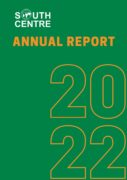International Investment Regime
Painting the Grass Green: A Climate Change Carve-Out in Investment Agreements
By Daniel Uribe
During the Twenty-Eighth Session of the Conference of the Parties (COP-28) of the United Nations Framework Convention on Climate Change (UNFCCC), States recognised the critical need to accelerate efforts to mitigate climate change and called on Parties to take action to transition away from fossil fuels in energy systems, to achieve net zero emissions by 2050. However, implementing such a transition finds obstacles in investor-state dispute settlement (ISDS) mechanisms, which can undermine regulatory actions necessary for climate policies, leading to a ‘regulatory chill’. As a response to these challenges, the Organisation for Economic Co-operation and Development’s (OECD) Future of Investment Treaties program has proposed a model carve-out provision to exclude fossil fuel sectors from ISDS protection with procedural safeguards, but its effectiveness may be limited. A holistic reform of investment agreements and additional measures, such as withdrawal from international investment agreements, are necessary to safeguard regulatory space and promote sustainable investment and a just transition.
(more…)
The India-EFTA Deal: A New Model for Developing Countries?
By Danish
Governments are shifting from investor-state dispute mechanisms to treaties that encourage and ease investment. The India-European Free Trade Association (EFTA) Trade and Economic Partnership Agreement could be setting a new standard for developing countries to promote and benefit from foreign investment.
(more…)
Foreign Investment Flows in a Shifting Geoeconomic Landscape
By Danish
The economic shocks from the pandemic and rising geoeconomic tensions have triggered an accelerated restructuring of foreign investment flows in global value chains. As the previous determinants of foreign investment are rapidly changing, many new risks and opportunities abound for developing countries looking to attract FDI into their economies. This paper therefore looks at some of the important issues affecting foreign investment flows to developing countries both now and in the future. It then lays out some policy imperatives which can help countries ensure that the inbound foreign investment is responsible, sustainable and contributes to achieving the national development priorities.
(more…)
Response to the Call for Inputs by the UN Special Rapporteur on human rights and the environment
“Should the interests of foreign investors trump the human right to a clean,
healthy and sustainable environment?”
South Centre
14 June 2023
To realize the right to clean, healthy & sustainable environment and reduce ISDS risks, States need to align their FDI policies with human rights, climate action and SDGs, including via reform of the international investment regime.
(more…)
Preserving Regulatory Space for Sustainable Development in Africa
By Roslyn Ng’eno
Investment has an important role for achieving sustainable development in developing countries. Although international investment agreements (IIAs) can serve as instruments to promote such objective, protection oriented IIAs have undermined the ability of States to regulate in the benefit of the community. Likewise large financial reparations imposed by arbitral tribunals have increased the threat of regulatory chill in the face of major global challenges. Strengthening the right to regulate of States and addressing regulatory chill are key matters to consider in the reform of IIAs and the international investment regime.
(more…)
South Centre Annual Report 2022

Read the South Centre Annual Report 2022 for an analysis of the situation faced by our members & other developing countries & for a summary of the Centre’s activities in 2022.
(more…)













